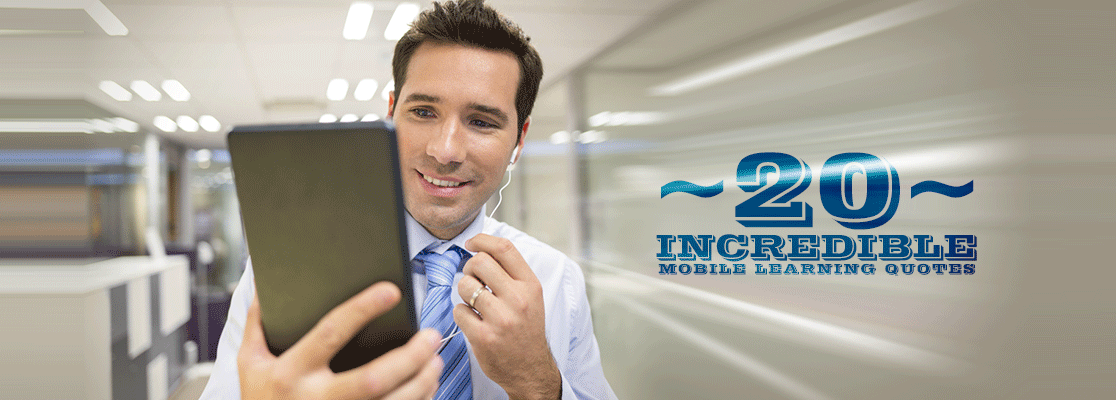THE QUOTE:
“Mobile phones are misnamed. They should be called gateways to human knowledge.” – Ray Kurzweil
THE JOURNEY:
We love mobile learning, and are excited about its potential, not just for learning, but also for performance support! As you would know, we have been trying our best to listen to some of the best brains in the world to get inspired. We also love sharing, and have been trying to reflect on some of the great learnings that we had been having throughout this wonderful journey through our blog posts with the learning community.
Today, we set out on a quick journey to revisit our most precious resources on mobile learning. There are two reasons for this that we wish to happily share with you:
- We are in the midst of planning an internal app store to assist our employees with performance support solutions (and make Learnnovators a great place to work), thanks to all inspirations that we received from many experts who we were able to meet for our ‘Cystal Balling with Learnnovators‘ interview series.
- We are also in the process of trying out some interesting stuff on Proximity-Based Learning usingGimbal beacons that we received recently from Qualcomm.
THE FINDINGS:
Here are a few of the most important thoughts that we were able to recall from our interviews (Crystal Balling Series) and our blog posts on mobile learning that we would like to share with you (in the form of excerpts) today:
From Our ‘Crystal Balling with Learnnovators’ Interview Series
- “We need to have mobile enabled content that doesn’t require tracking by the LMS and we have to get rid of the notion that if learning isn’t tracked it’s not formal or not valuable.” – Karl Kapp (in our interview with him here)
- “I’d like to make other performance support apps for instructional designers. I’d love to see eLearning designers make more apps.” – Connie Malamed (in our interview with her here)
- “…one training event is not sufficient for people to transfer learning to new situations. If you are seeking strong retention and learning transfer, people need distributed learning and performance support.” – Connie Malamed (in our interview with her here)
- “The incredible expansion of mobile technologies is another important factor that will both drive and support the deployment of workplace learning tools and systems in the areas of performance support, particularly, but also in areas such as expert location, crowdsourcing-based problem solving and others.” – Charles Jennings (in our interview with him here)
- “I am excited by them all, not for the technologies themselves, but for learning possibilities they offer us!” – Geoff Stead (in our interview with him here)
- “One of the skills in creating e-learning courses was the story-telling dimension. This changes with mobile.” – Geoff Stead (in our interview with him here)
- “Look up to the leaders in your sector: High performing organizations are twice as likely to be doing mobile learning already. Learn from them.” – Geoff Stead (in our interview with him here)
- “Mobile is full of exciting technologies, and approaches that can help us transform how we teach, work and learn. We just need more passionate educators to think bigger, and fit them into our learning.” – Geoff Stead (in our interview with him here)
- “You can see an evident shift from formal curriculum-based learning to informal just-in-time learning, and this is just the beginning!” – Pooja Jaisingh (in our interview with her here)
- “Designing for a mobile course is much different than designing for a desktop course.” – Eric Schuermann (in our interview with him here)
- “The reality is that responsive design is part of the equation for certain types of content; and it’s a consideration moving forward. But it’s not optimal to start with the expectation that every course created also needs to be built with a responsive design. It depends on the situation, delivery, and objectives.” – Tom Kuhlmann (in our interview with him here)
- “Today, very few rapid development tools produce ‘responsive’ output. I am certain that in the near future we will see this as one of the focus areas for many of the tools producing learning content for mobile delivery.” – Janhavi Padture (in our interview with her here)
From Our Blog Posts
- “Mobile apps are among the best forms of performance support available today, and just like any professional for whom ‘information’ is the key, learning designers too could greatly benefit from mobile app solutions.” – Top 5 Performance Support Apps for Learning Designers
- “Distributed practice can be effectively embedded with today’s learning trends such as informal and social learning, gamified learning, and ubiquitous learning.” – Beating the Forgetting Curve with Distributed Practice
- “Mobile learning is one such major revolution that demands a shift in the mere thinking of ‘learning’. It requires us to unlearn and relearn the traditional notions of Learners’ attention span (Short), Learning style/preference (Ubiquitous), New (additional) dimensions to learning (Context)” – Top 8 Competencies of a Mobile Learning Designer
- “We believe that mobile learning is going to be the most disruptive game changer in 2014.” – Top 9 e-Learning Predictions for 2014
From Other Sources
- “mLearning is not elearning on a mobile device.” – John Feser
- “Instructional designers need to run, not walk, away from classroom-thinking and get to the point of providing short, quick business focused learning points that are easily accessible when and where our learners need them. This means leveraging new technologies to deliver non-traditional instruction.”– Karl Kapp
- “You can’t teach people everything they need to know. The best you can do is position them where they can find what they need to know when they need to know it.” – Seymour Papert
What other inspiring quotes on mobile learning have you come across? Please share.
Written by Santhosh Kumar
_________________________________
Published on 05-Apr-2014






